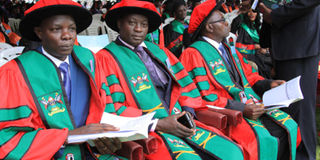Adopting innovative ways to boost research

It emerged that many graduate students take long to complete their courses because of failure to complete their research but a new intervention by the Makerere University School of Public Health has seen students improve and complete in time. PHOTO BY ALEX ESAGALA
Research is meant to be an engine of development for any country and for many countries that have developed sustainably, there is evidence of practical use of research.
“Research has been used in Israel to facilitate development of the agriculture sector yet they do not have the best soils. They have invested in innovation to improve their agricultural outputs. Similarly, in health, we are struggling with common health challenges but if we invest in good research, we will have more solutions to overcome such challenges,” Prof Rhoda Wanyenze, the dean at Makerere University School of Public Health (Musph), states.
She calls on government to invest in research as a tool to drive development. As such, well done research ought to be the starting point to feed into policy and development in Uganda.
However, the average scenario is of a working student with hardly enough time to dedicate to good research which either compromises its quality as they will hastily execute it or hire someone to do it for them, which raises issues of authenticity.
“People who do distance learning and are working, often struggle a lot because they need to find protected time to read and write their dissertation. When we organise a week for them to work on their proposal, they ask for time off work and sit here and leave when they have done it,” the professor observes.
To remedy the problem, the school of public health annually organises a workshop day where students with challenges of writing their research proposals or research, meet with their supervisors and other lecturers to be guided on dealing with their research work.
Beating challenges
James Kitonsa, a distance student pursuing a master’s at the School of Public Health, says he has a lot of information but finds challenges in sieving it.
“This workshop has refocused us back to the main areas, for example data analysis. My research, for example, is quantitative but I have learnt some qualitative aspects that will facilitate my research process,” Kitonsa explains.
Prof Wanyenze explains that there are common areas which are challenging for example statistics, epidemiology and methodology are research areas that are not easy to conceptualise so when students are with lecturers or their supervisors, they are able to go over these concepts again with them.
“The workshop has helped me to integrate the knowledge from public health training and the Information Technology (IT) training so that I am able to design artefacts as a health intervention that can help sort public health concerns,” explains Joy Bayonya, a health informatics officer and second year master’s student.
According to Dr Simon Kasasa, a senior lecturer in the department of epidemiology and bio statistics at Makerere University, the initiative of bringing together students to interface with their lecturers, is important to particularly distance learning students who cannot commit time on their own to proceed with their proposal and research.
He adds, “This kind of arrangement (workshop) gives them an opportunity to create time and try to maximise on their expected outcomes.”
Dr Barbara Kirunda Babusiibwa shares similar sentiments, applauding the initiative for helping students in writing their proposal as well as developing concepts.
Fosters contact
“The workshop is helpful to the student because it increases contact interaction between them and the lecturer. The students are given some overview lectures on a number of key things that concern research proposal development, the different methods that can be used to collect data at an early stage and that shapes their thought process,” Dr Kirunda explains.
“When students come together, they also help and support each other as opposed to dealing with challenges alone. We have started recording lecturers. If you do not remember what a lecturer said, you can listen in again. This is particular with complex statistical concepts,” Prof Wanyenze explains.
She adds, “We are trying to use social media too, including group interactive moderation sessions to go over difficult issues. ”
Last year, the graduation number more than doubled as a result of the innovative methods. “All we did was to systematically identify our students who were not graduating and identify their challenges. As a lecturer, I take time to call or send emails to my students because I want them to graduate,” the dean observes.
To her, when a student does not do their research, they are cheating. “It is something we discourage. Some people get away with it but we have caught a few,” she adds.



